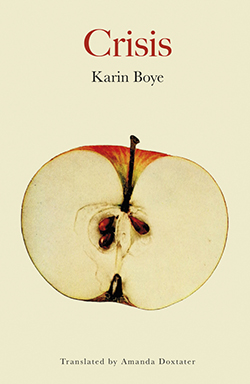
Sometimes a book grabs hold of a reader and won’t let go. For Amanda Doxtater, that book was the 1934 novel Kris by Swedish author Karin Boye. Doxtater first encountered the novel in the 1990s as an undergraduate in the UW Department of Scandinavian Studies, and it became the subject of her master’s thesis, also at the UW. Now she is a professor in the same department and has completed the first English translation of the novel, published by University College London's Norvik Press.
“This novel, with all of its elegance and awkward peculiarities, has compelled me for half of my life — unlike any other book I’ve encountered,” Doxtater says in the afterward to the English translation.
Kris — which translate to Crisis in English — is a challenging book with an unorthodox structure. The semi-autobiographical novel taps into the mind of a Swedish college student grappling with religious and gender identity, love, and sexuality in the early 20th century. Within the coming-of-age story are Bible excerpts, numerous references to philosophers, debates between “black” and “white,” and other unusual musings.
This novel, with all of its elegance and awkward peculiarities, has compelled me for half of my life.
“The book is so cerebral and so personal at the same time,” says Doxtater, assistant professor and Barbara Osher Endowed Chair of Swedish Studies. “It is an existential story that’s told through the author’s personal experience.”
Doxtater first attempted to translate Kris after she read it as an undergraduate. She laughs to recall how she holed up in Allen Library with the book, a pen and paper, and a hefty Swedish-English dictionary.
“I had some overblown idea of my abilities,” she says. “I didn’t get very far. But the book was just so weird and dramatic. And maybe I was enough of an outsider to feel sympathy for someone who had trouble fitting in.”

Many women in Sweden have had a similar fascination with the book. Several told Doxtater that Kris was a formative part of their growing up. They were shocked to learn that the book had never been translated into English.
Translating such a challenging book was daunting for Doxtater, especially as her first major translation project. Then again, all literary translation is difficult, requiring judgments about everything from tone to word choice to structure.
“As a translator, you have to make so many decisions,” says Doxtater. “You can’t translate something without interpreting it. And there is a sense of responsibility to the author. I’m bringing this novel to English-speaking audiences for the first time.”
Doxtater understood that Swedish readers familiar with Boye’s work have more tolerance for the weirdness of Crisis than a new audience would. She sought to retain the book’s strangeness while making it more readable for a non-Swedish audience. That meant cutting back on Boye’s many run-on sentences without sacrificing the rhythm of the writing. It meant modernizing some of the 1930s language. And it meant grappling with the differing pronoun usage in the two languages. Swedish literature often uses a passive voice, which is inherently gender neutral, but that passive voice feels stilted to American readers. Yet assigning gender-based pronouns was complicated given that the main character was still developing a gender identity.
Beyond these challenges, the book incorporates poetry by other writers, including poems that had never been translated into English before. And with the main character undergoing a religious crisis, the text included extensive direct and paraphrased quotes from the Bible.
To help navigate all these challenges, Doxtater tapped the expertise of colleagues in the US, Sweden, and the United Kingdom, including a translator specializing in poetry and a Swedish religious historian. She shared portions of the translation with the UW's Simpson Center for the Humanities translation working group, and before the translation was published at least four people read the entire text, looking at the Swedish and English versions side-by-side.
“Working with other translators made me appreciate how much effort and care and elegance a translator brings to a project,” Doxtater says. “Often translation is seen as secondary or derivative or viewed in terms of what has been lost. I don’t believe in that. Translation brings another text into the world.” She adds that by choosing to translate certain literary works, translators influence which voices are introduced to a broader audience.
Having taking her own deep dive into translation, Doxtater plans to introduce a translation component into some of her undergraduate courses, encouraging students to pursue their own projects. She hopes they come to appreciate the challenges of translation as much as she does.
“Translation is really magical,” she says. “It’s a whole mess of hard work, a lot of labor, but it’s also really amazing to read something that’s the same but very different at the same time. It’s mind-blowing when you stop and think about it.”
More Stories

AI in the Classroom? For Faculty, It's Complicated
Three College of Arts & Sciences professors discuss the impact of AI on their teaching and on student learning. The consensus? It’s complicated.

A Love of Classics and Ballroom
Michael Seguin studied Classics at the UW and now owns Baltimore's Mobtown Ballroom. The two interests, he says, are more connected than they might seem.

Bringing Music to Life Through Audio Engineering
UW School of Music alum Andrea Roberts, an audio engineer, has worked with recording artists in a wide range of genres — including Beyoncé.